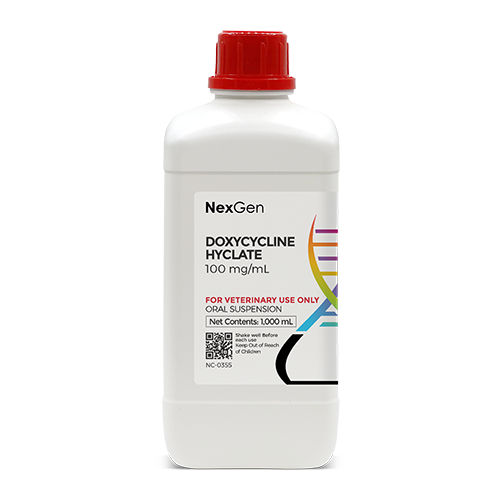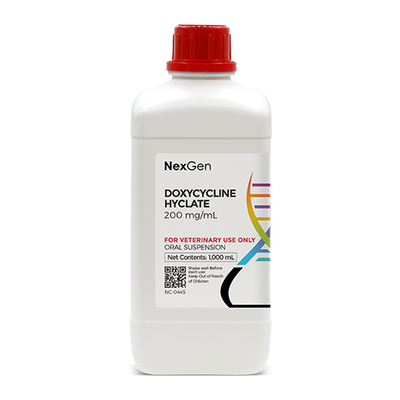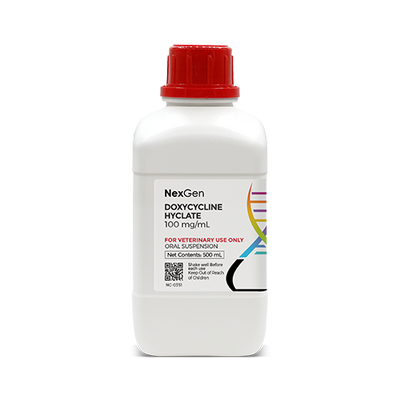
Doxycycline Hyclate 100 mg/mL, Oral Suspension, 1000mL
Login for pricing
- Brand
- Mixlab
- SKU:
- NC-0355
- Product Type:
- Suspension
- Size:
- 1000ml
- Administration:
- Oral
- Therapeutic Class:
- Antibiotic
As with humans, there is an increased risk for horses contracting bacterial diseases after their immune system has been compromised by a viral infection. Such infections are more common in horses that that travel or spend a lot of time around other horses. Foals and older horses are more at risk since their immune systems are not as strong as horses in their prime.
Horses that are sick with a bacterial infection often have accompanying digestive upset or upper respiratory symptoms. Systemic bacterial infections typically cause a fever and lethargy, but there are other localized bacterial infections that can plague horses.
Strangles is caused by the bacterium Streptococcus equi equi and is characterized by abscessation of the lymphoid tissue in the upper respiratory tract. The bacterium is transmitted via direct contact with infected horses or subclinical shedders, or indirectly via contact with equipment or nasal discharges from infected horses.
Diarrhea and enterocolitis in horses is most often caused by the bacterium Clostridium difficile. Foals and adult horses are equally susceptible to C. difficile infection. The highly resistant spore of this bacterium is the infectious unit of transmission, which occurs primarily via the fecal-oral route. Two major risk factors for the development of C. difficile-associated disease (CDAD) in adult horses are hospitalization and antimicrobial treatment, although sporadically, cases of CDAD can occur in horses that have not received antimicrobials or been hospitalized.1
Lyme disease is induced by the spirochete B. burgdorferi. These are transmitted to horses by infected ticks. Not all infected horses will develop clinical signs of Lyme disease. If clinical signs do occur, they can include chronic weight loss, sporadic lameness, shifting leg lameness, low-grade fever, muscle tenderness, chronically poor performance, swollen joints, arthritis and diverse orthopedic problems. Neurological signs such as depression, dysphagia, head tilt and encephalitis have been reported in chronic cases.2
Where to buy Doxycycline
Doxycycline is available in the U.S. through pharmaceutical manufacturers and through veterinary custom compounding companies.
Please consult your veterinarian prior to beginning any treatment regimen.
FOR RX ONLY: A valid prescription from a licensed veterinarian is required for dispensing this medication.
1Diab SS, Songer G, Uzal FA. Clostridium difficile infection in horses: a review. Vet Microbiol. 2013 Nov 29;167(1-2):42-9. doi: 10.1016/j.vetmic.2013.03.032. Epub 2013 Apr 10. PMID: 23642413.
2Radolf JD, Caimano MJ, Stevenson B, Hu LT. 2012. Of ticks, mice and men: understanding the dual-host lifestyle of Lyme disease spirochetes. Nature Rev. Microbiol. 10, 87-99.














